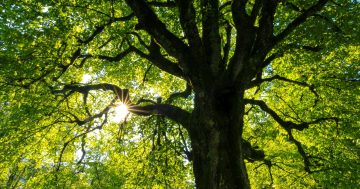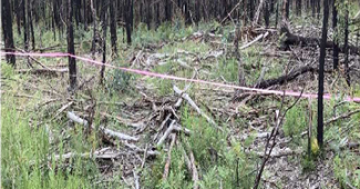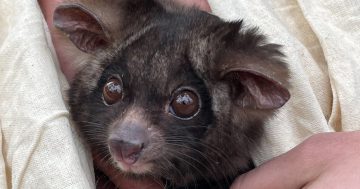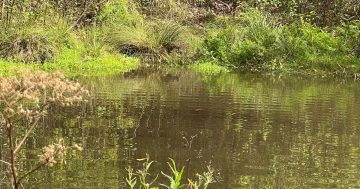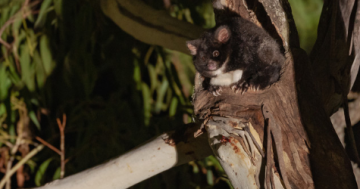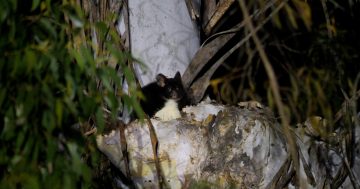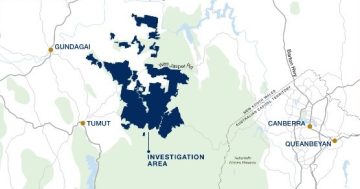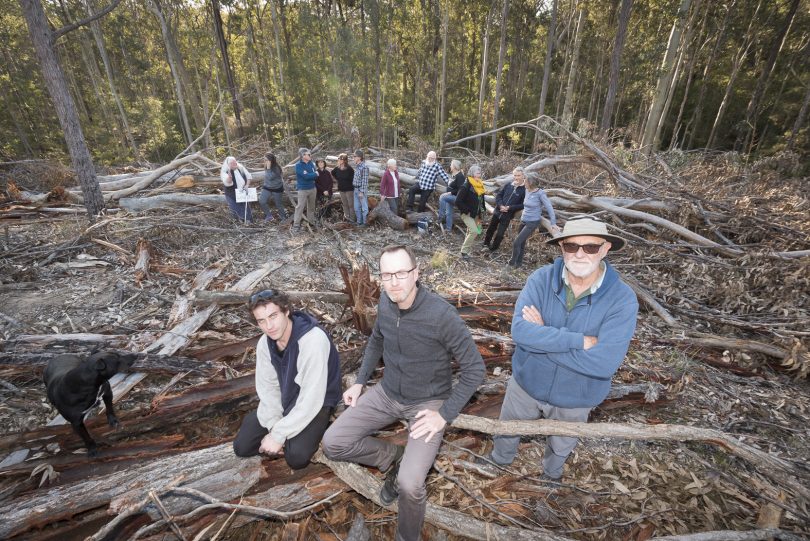
NSW Greens MP David Shoebridge (front and centre) visits Coast Watchers and Friends of the Forests in Mogo. Photo: Gilliane Tedder.
Forestry Corporation has been fined $45,000 for felling habitat trees in Mogo State Forest, but the corporation says since the Black Summer bushfires it has adopted environmental safeguards that go above what is required by law.
A NSW Environment Protection Authority (EPA) spokesperson said the alleged offences in Mogo occurred in 2020 and its investigation continued through last year.
Hollow bearing trees are used by many animals for their habitat and are protected under the Coastal Integrated Forestry Operations Approvals, which are the rules for logging the Forestry Corporation of NSW (FCNSW) must follow, the spokesperson said.
“Instances where illegal logging is identified are likely only a tiny proportion of the cases where this has happened, so these instances of feed trees and hollow bearing trees are devastating and represent only a fraction of the damage,” NSW Greens MP and forests spokesperson David Shoebridge said.
A spokesperson for FCNSW said the corporation had done ground assessments with trained staff walking through Mogo State Forest to identify trees with visible hollows and identified and protected hundreds of such trees during the harvesting operations.
“A small number of trees were determined by the EPA to have been hollow bearing trees after they were felled and FCNSW has received these fines as a result,” the spokesperson said.
“Forestry Corporation is currently discussing with the EPA the definition and identification and visibility of hollow bearing trees before and after harvesting.”
The spokesperson said since the 2019/20 Black Summer bushfires, the corporation had adopted additional environmental safeguards that went above the strict rules in place in NSW.
This was to balance providing timber to the local industry that employed local people to produce important products, along with ensuring the forests could regenerate after the fires.
“These safeguards include things like setting aside additional areas from harvesting in feed tree clumps and landscape exclusions and undertaking additional landscape surveys,” they said.
“We have also increased our focus on compliance with additional resources on the ground for planning and monitoring.”
But Mr Shoebridge alleged, “Year after year we see Forestry Corporation failing to comply with even the most basic rules for logging.”
“While increased penalties and compliance activities could help [improve the corporation’s compliance with regulations], ultimately the industry has lost its social license and it’s time to end native forest logging,” he said.
He claimed a financial analysis he conducted showed the NSW government paid $411 per hectare to log over 13,000 hectares of native forest in 2021.
“For more than a decade the NSW public has been paying for native forest logging because the costs are so high and the profits so tiny. That has to end,” Mr Shoebridge said.
“Instead of investing in a loss-making industry we could use this money to expand the robust plantation sector, which is dogged by fire damage and ongoing underinvestment from the state government.”
The Forestry spokesperson said native forests provide important timber resources not available from the relatively-small holdings of hardwood plantations planted in NSW over the last 50 years.
They said the demand for these timber products is strong for housing and furniture as well as infrastructure like power poles and wharf timbers.
NSW Nature Conservation Council said Mogo State Forest is home to threatened species including powerful owls, greater gliders, gang-gang cockatoos and yellow-bellied gliders and is an important food source for the critically endangered swift parrots.







